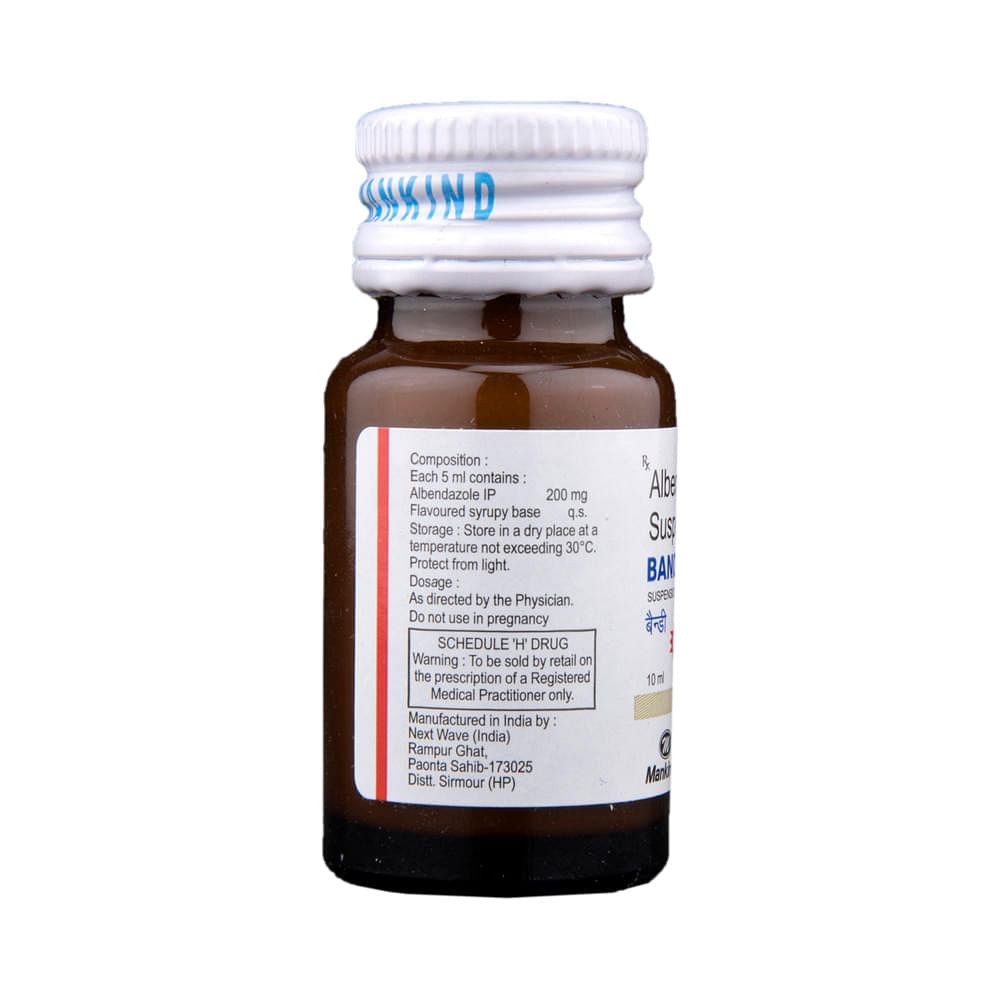
Wormzip 200mg Oral Suspension
Manufacturer
Anglica Healthcare
Salt Composition
Albendazole (200mg)
Key Information
Short Description
Wormzip 200mg Oral Suspension is effective against a range of parasitic worm infections in children.
Dosage Form
Oral Suspension
Introduction
Wormzip 200mg Oral Suspension is effective against a range of parasitic worm infections in children. It restrains the worms from absorbing the body's essential nutrients, causing them to lose their energy and leading to their eventual death. The dead worms are then removed from your child's body through the stool.
Directions for Use
Take this medicine in the dose and duration as advised by your doctor. Check the label for directions before use. Measure it with a measuring cup and take it by mouth. Shake well before use. Wormzip 200mg Oral Suspension may be taken with or without food but it is better to take it at a fixed time.
Safety Information
Side Effects
Nausea Vomiting Dizziness Headache Abdominal pain Loss of appetite Hair fall Mild fever Sore throat
Alcohol Warning
It is not known whether it is safe to consume alcohol with Wormzip 200mg Oral Suspension. Please consult your doctor.
Breastfeeding Warning
Wormzip 200mg Oral Suspension is safe to use during breastfeeding. Human studies suggest that the drug does not pass into the breastmilk in a significant amount and is not harmful to the baby.
Pregnancy Warning
Wormzip 200mg Oral Suspension may be unsafe to use during pregnancy. Although there are limited studies in humans, animal studies have shown harmful effects on the developing baby. Your doctor will weigh the benefits and any potential risks before prescribing it to you. Please consult your doctor.
Interacting Medicines
Estradiol Tibolone Estriol Carbamazepine
How it works
Worms enter inside your child's body when your child eats or drinks something that's infected with a worm or its eggs. Once inside the body, these worms get attached to the inner walls of the intestines and can even enter other body organs. Wormzip 200mg Oral Suspension works by keeping the worms from absorbing sugar (glucose), thereby depleting their energy level. This causes the worms to die, thereby treating your child's infection.
Quick Tips
Give this medicine to your child with a fat-containing food such as milk as it enables better absorption in the body. Follow the prescribed dosage strictly. Make sure to complete the dosage as stopping abruptly may lead to re-infection. Worm infections are easily spread between family members. Your doctor may recommend treatment for all family members on the same day. Maintain a neat space and hygiene around your child.
Related Medicines

Bandy Suspension

Zenkid 200mg Oral Suspension

Z Bend 200mg Oral Suspension

Albesan Plus Oral Suspension 200mg

Albenmint 200mg Oral Suspension

Wormicas 200mg Oral Suspension

Frazol 200mg Oral Suspension

Neben Oral Suspension

Wormy 200mg Oral Suspension

Aben Plus 200mg Oral Suspension
Frequently asked questions
How can I identify if my child has a worm infection?
If your child experiences symptoms such as an itchy bottom, difficulty sitting, fatigue, restless sleep due to anal itching, persistent stomach pain with loss of appetite or frequent indigestion, or pica (eating inedible substances), it may indicate a worm infestation. Consult your child's doctor immediately if you notice any of these symptoms. The doctor may request stool and blood samples on three separate days for examination. Based on the test results, the doctor will determine the appropriate treatment and prescribe medication.
How can my child become infected with intestinal worms?
Children are typically more susceptible to infection. The infection can be transmitted through the eggs of worms present in human feces that contaminate soil in areas with poor sanitation. Transmission can occur by drinking contaminated water, eating contaminated vegetables and fruits without washing or peeling, or by playing in soil contaminated with worm eggs. When your child returns home after playing, ensure they clean up using soap and water.
What does deworming mean?
Deworming is the process of killing and expelling worms from the body. Wormzip 200mg Oral Suspension is a widely used medication for deworming treatment in children.
Can other medicines be given at the same time as Wormzip 200mg Oral Suspension?
You can give your child pain relievers and fever reducers unless your doctor has advised against it. However, there are some medicines that should not be taken with Wormzip 200mg Oral Suspension. To minimize the risk of side effects, consult your child's doctor before giving any other medications.
What is the best time to give Wormzip 200mg Oral Suspension to my child?
Wormzip 200mg Oral Suspension can be given at any time of the day, but it's recommended to administer it with a fat-containing food, such as milk.
Who should not take Wormzip 200mg Oral Suspension?
Wormzip 200mg Oral Suspension should not be given to children with a known allergy to albendazole or similar medicines like mebendazole or thiabendazole. Signs of an allergic reaction may include an itchy skin rash, shortness of breath, and swelling of the face or tongue. Inform your child's doctor about all medical conditions and any other medications your child is taking, as they may interact with this medicine.


